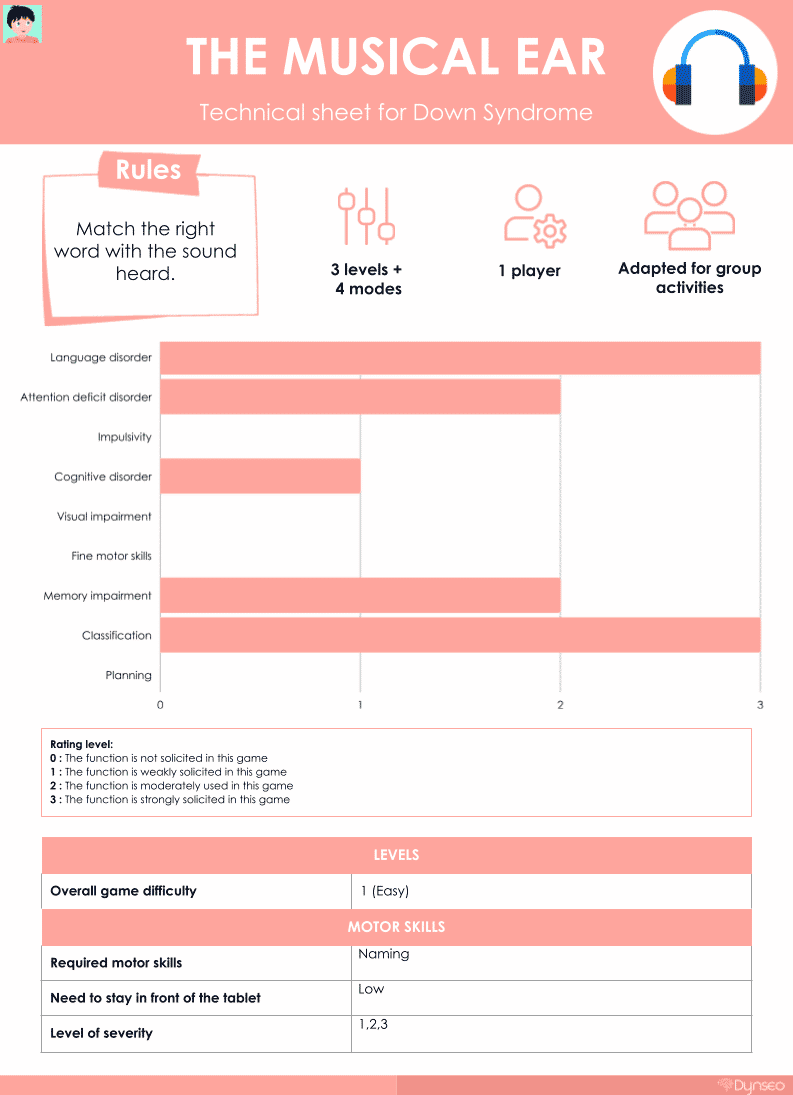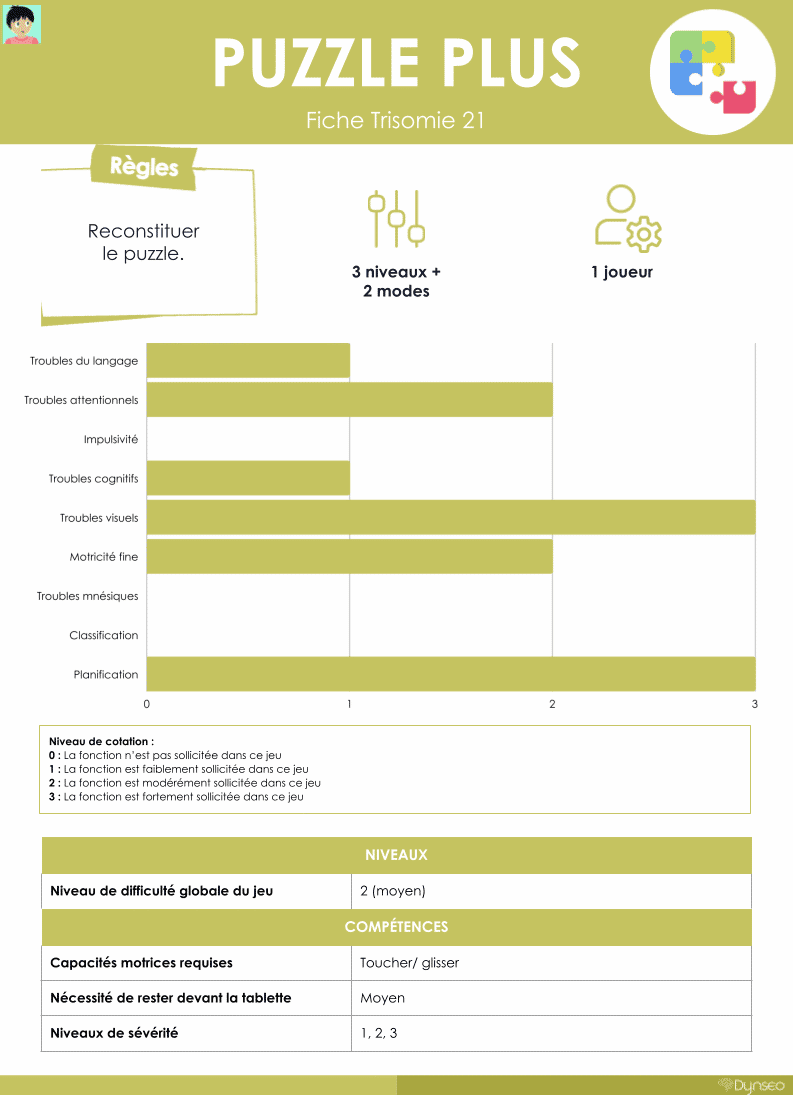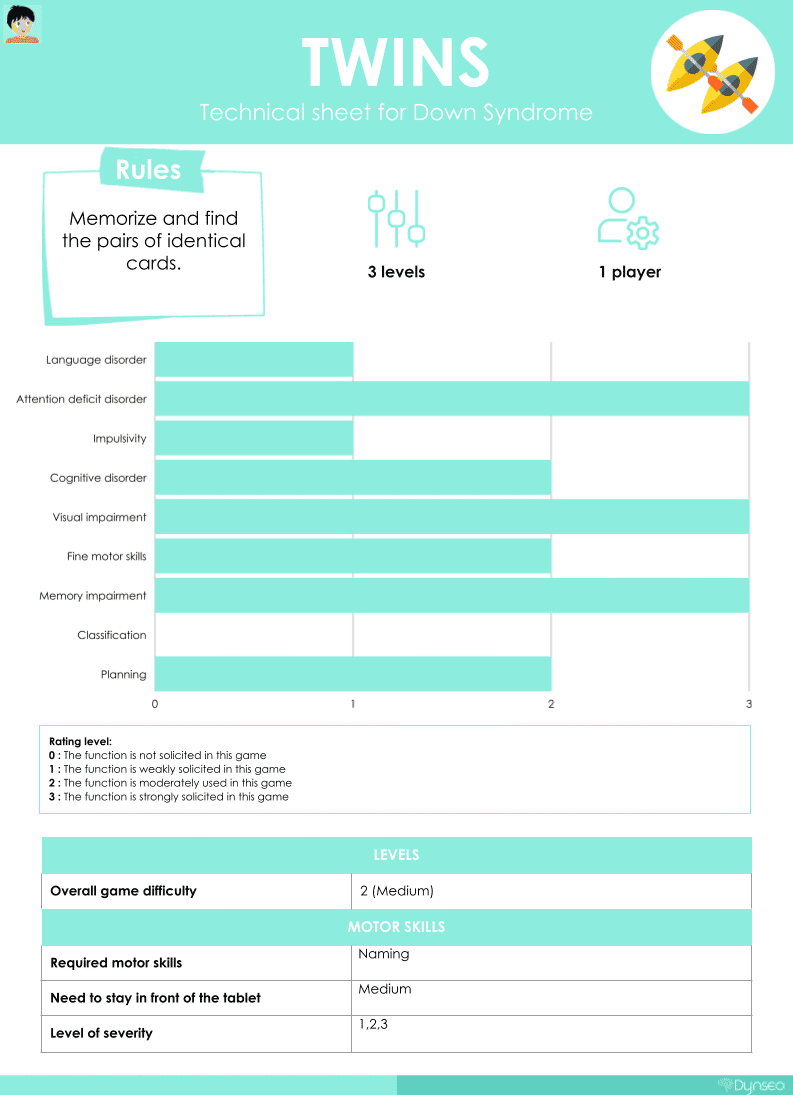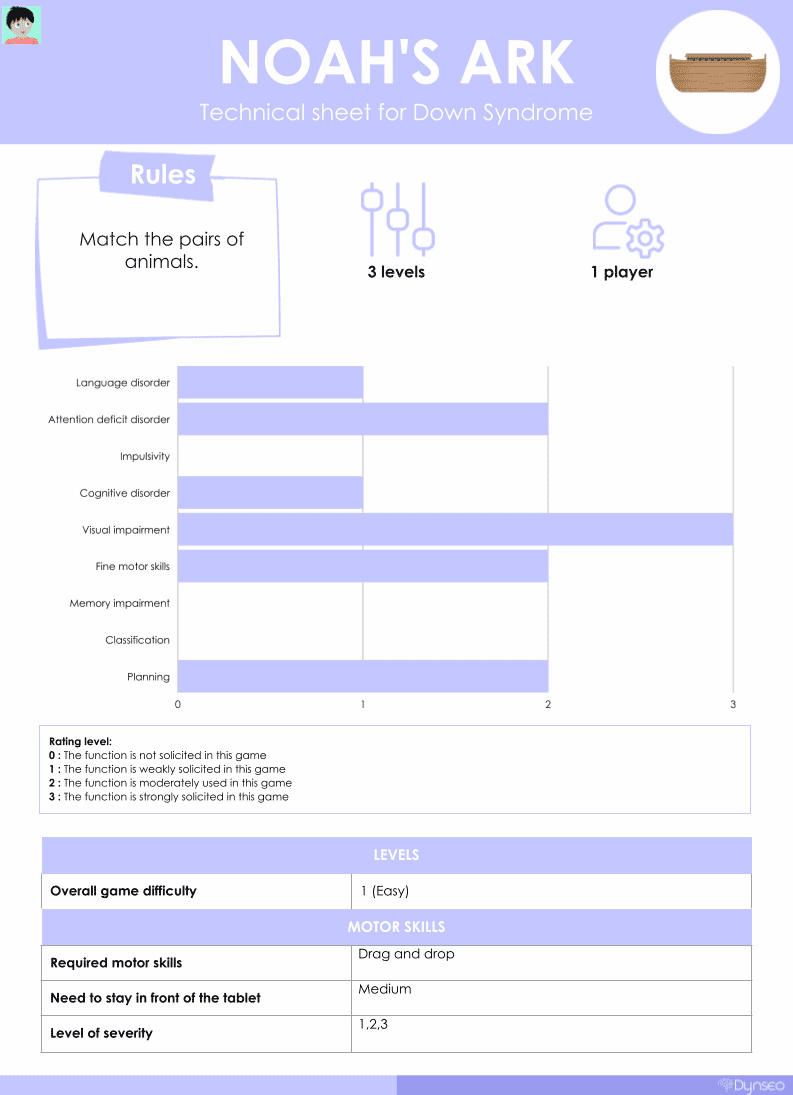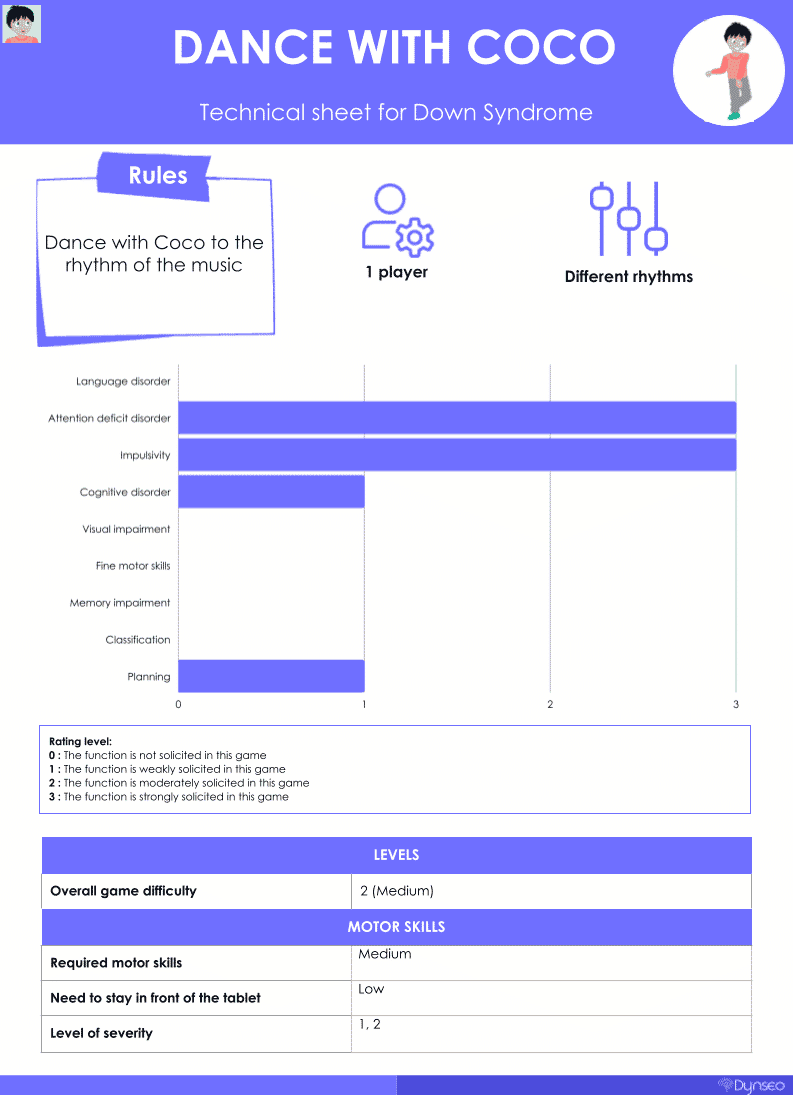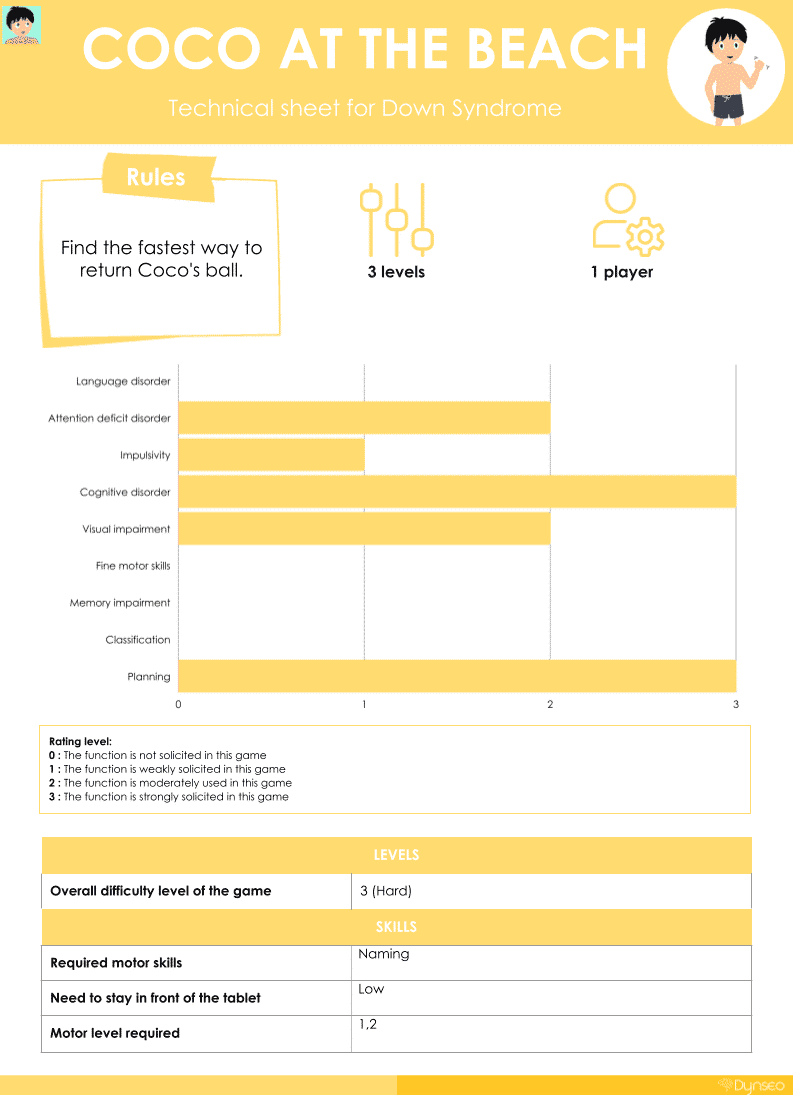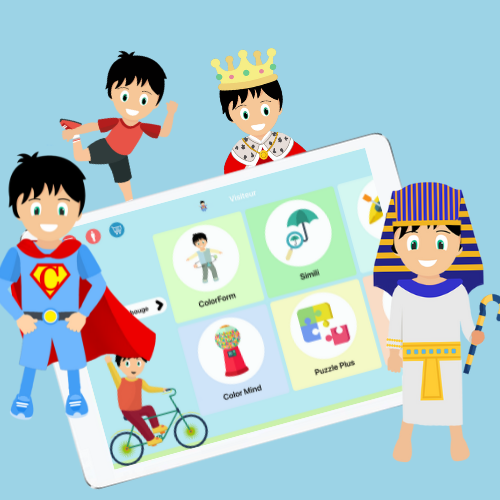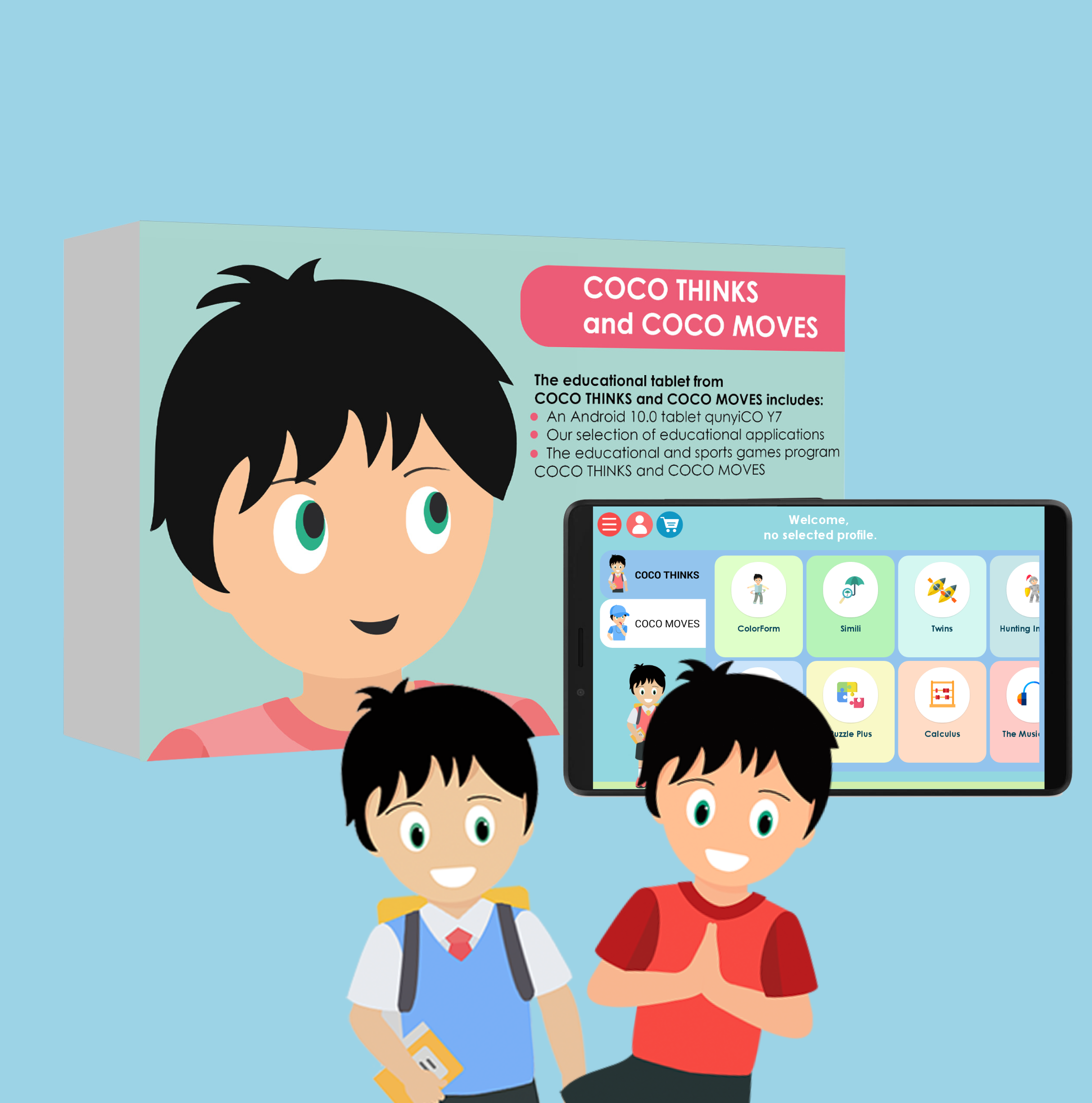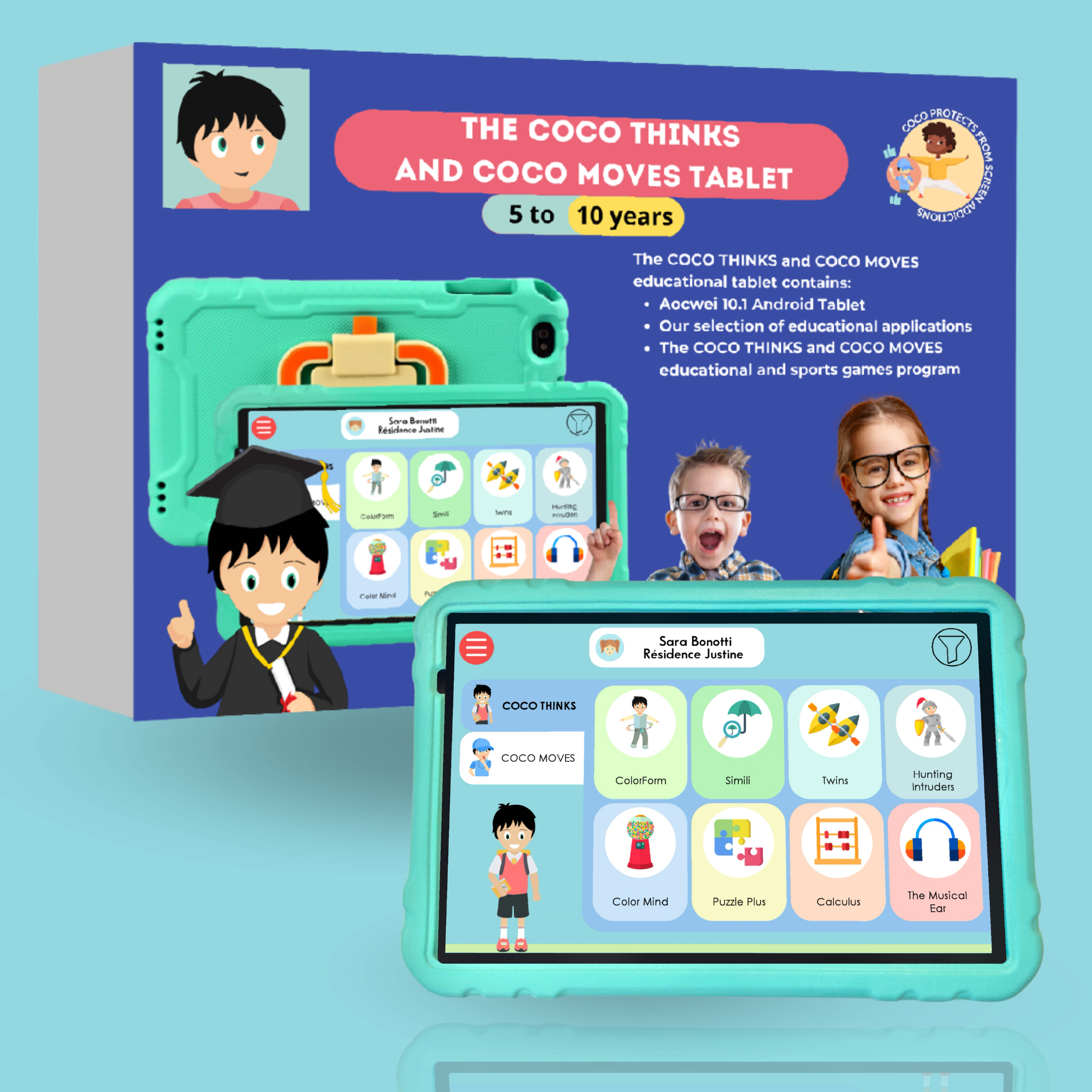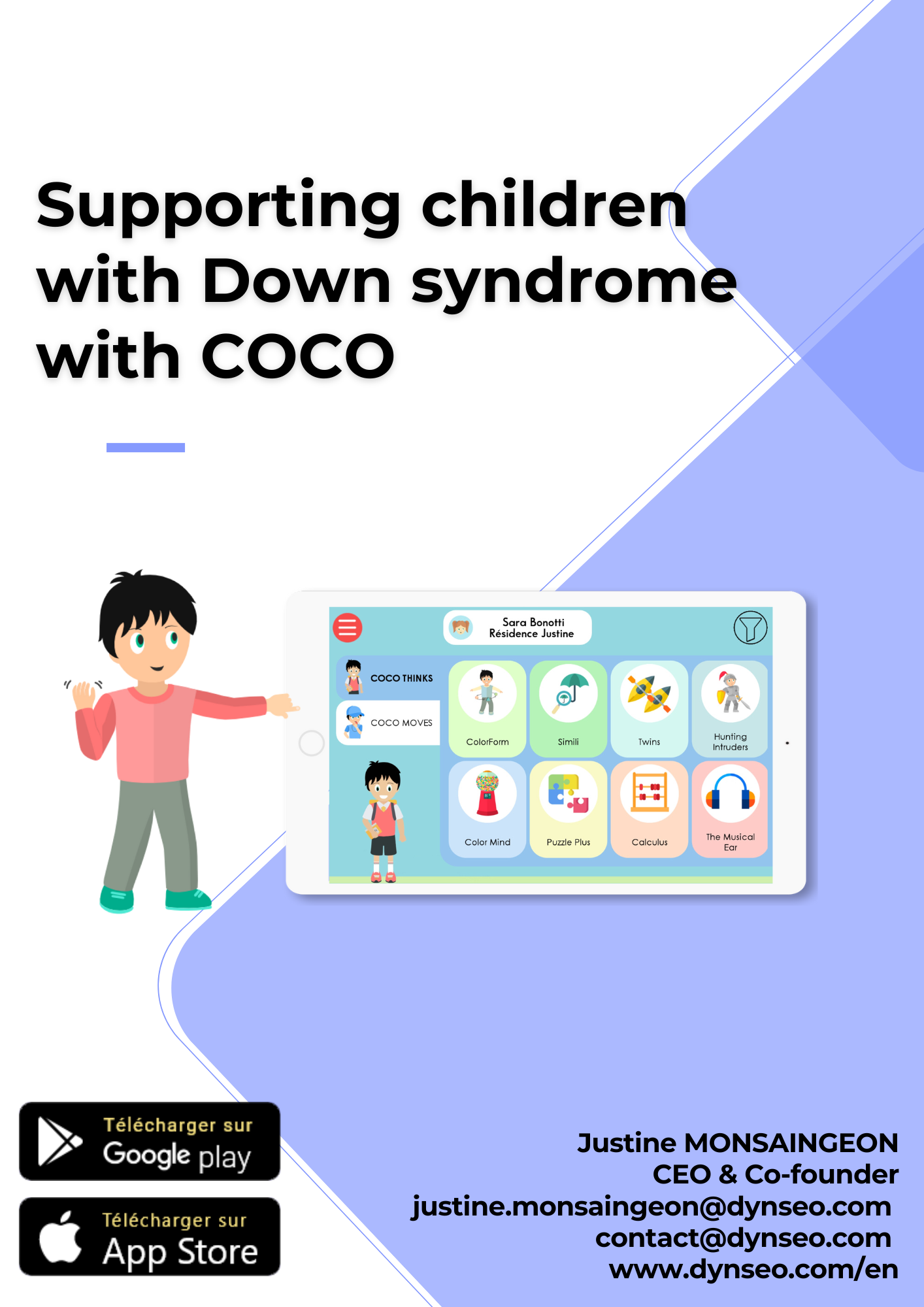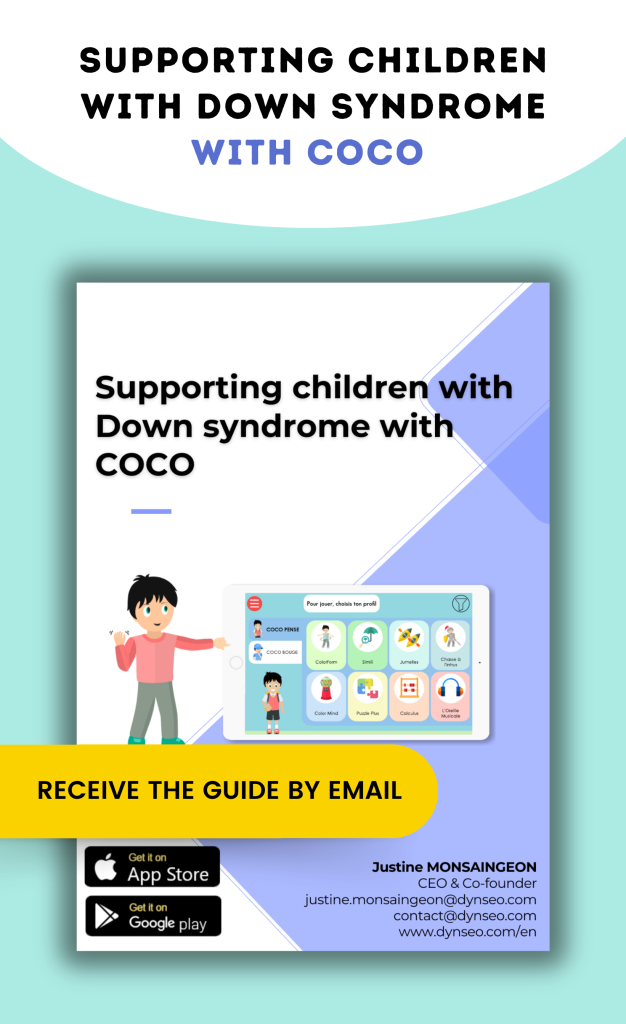Dynseo proposes
DOWN SYNDROME with COCO

Down syndrome is a non-hereditary chromosomal abnormality that leads to the presence of three chromosomes 21.
This pathology influences the development of the child who reaches the stages of its development with a more or less marked delay.
Dynseo and its team are very involved in the development of children and their goal is to allow all children with Down syndrome to develop in harmony and serenity. By following the child’s rhythm, we can give them the tools to be autonomous and live well in society.
Down syndrome is a congenital anomaly that can lead to difficulties in language, visual perception, motor skills or cognitive abilities. Each child has a different delay that varies according to their abilities and depends on several factors.
Did you know that each year, about 1 in 1,000 babies are born with Down Syndrome worldwide?
Cognitive disorders
Difficulty in classifying objects
Planning difficulties
Simple and limited strategy
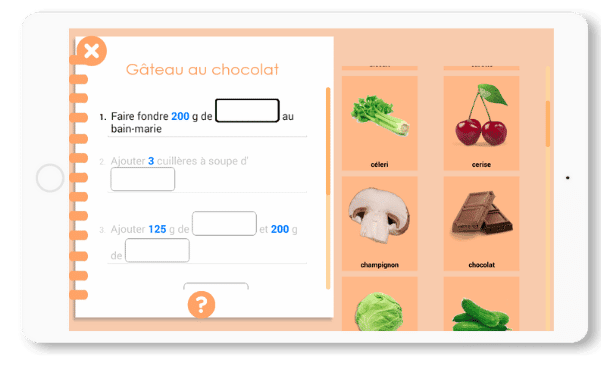
Visual skills
Altered visual perception
Difficulty following objects with sight
Difficulty with visual analysis
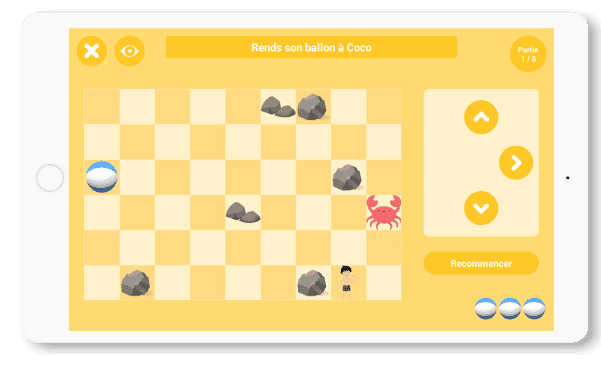
Motor functions
Hypotonia
Delay in acquiring certain motor functions
Altered muscle tone
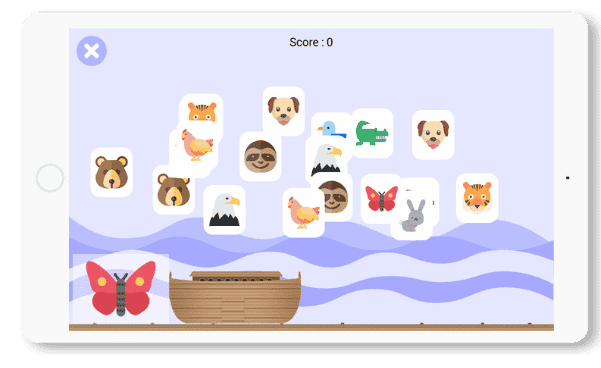
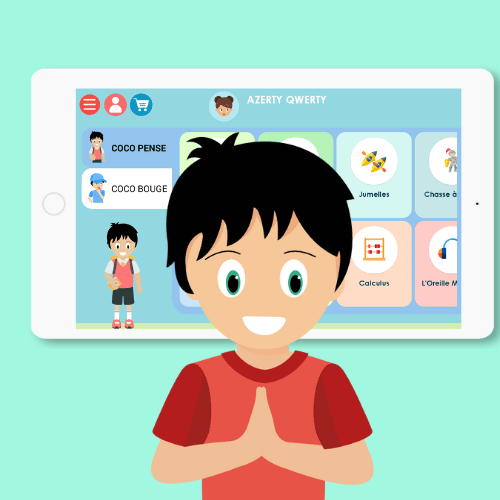
COCO FOR CHILDREN WITH DOWN SYNDROME
Working with a person with Down syndrome is possible with activities adapted to their needs. The Coco app includes more than 30 games adapted for children to stimulate the different cognitive functions efficiently, all while having fun. Children with Down syndrome are, above all, children like any other who like to play and have fun.
Coco offers a solution that takes into consideration both the emotional aspect (by offering fun games) and the cognitive aspect (by offering cognitive stimulation games) of a child’s development. Everyone wins!
Today Coco accompanies children with Down syndrome through their speech therapists, psychologists, and psychomotor therapists, in residence, at the office or for home help. Professionals who wish to subscribe to Coco can benefit from an online monitoring platform. This platform allows them to see the evolution and improvement of people with Down Syndrome to personalize their care.
Here is a summary that allows you to see with which games you can help a child with Down syndrome according to their needs.
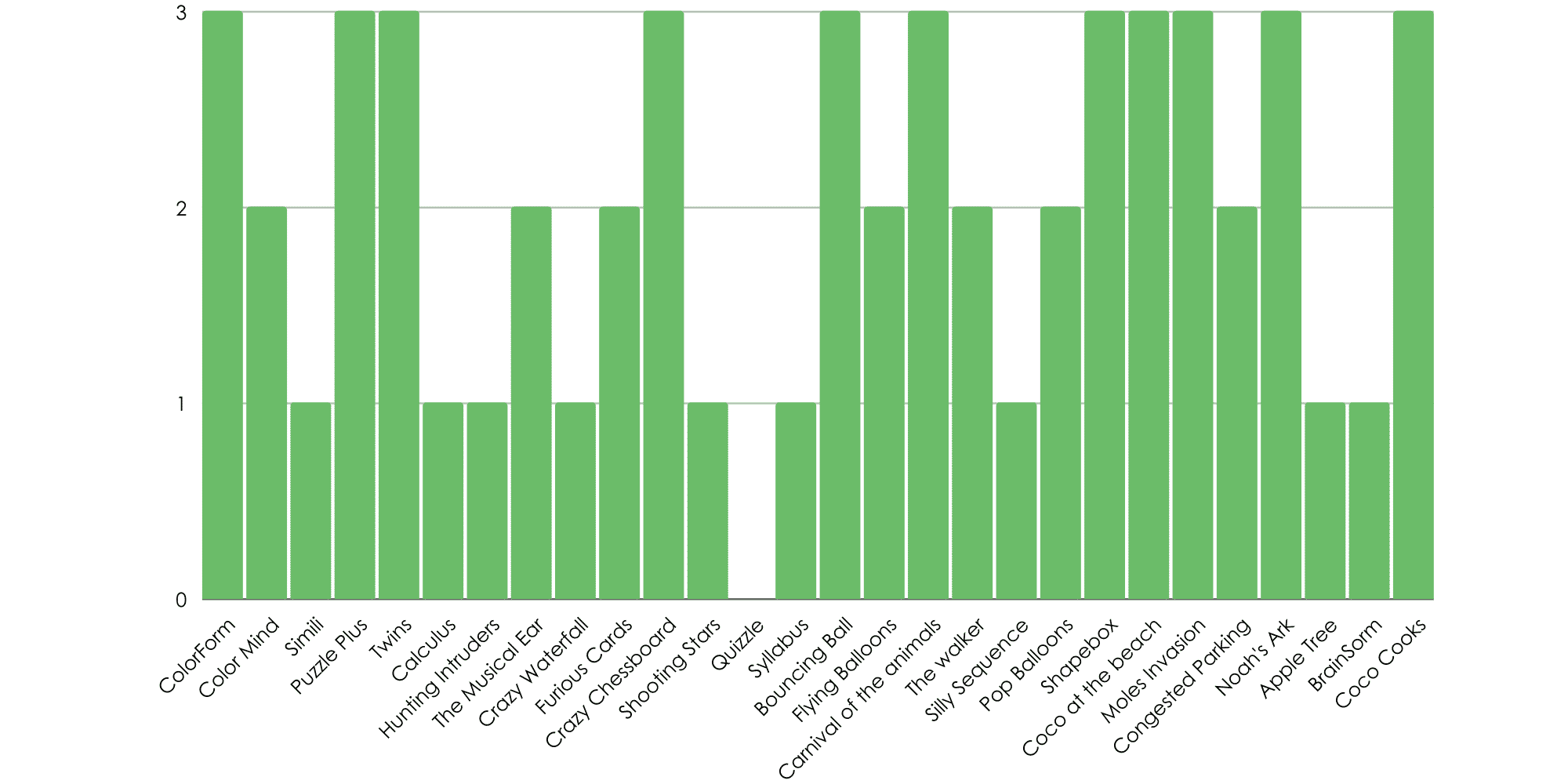
Coco games adapted to Down syndrome
Filters
to sELECT ADAPTED ACTIVITIES
With COCO THINKS and COCO MOVES, children’s cognitive training moves up a gear: it is personalized, relevant, and without failure.
With the filters, you can view games by specific need (Down syndrome) or by target cognitive function.
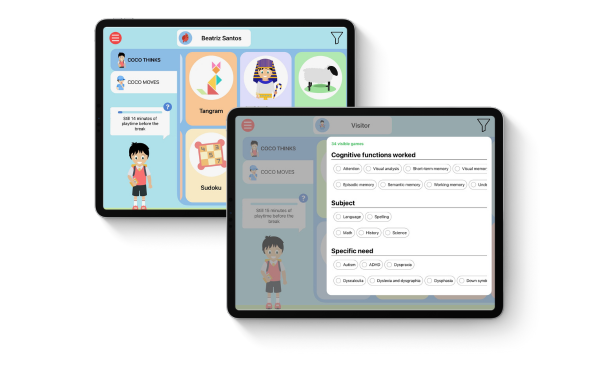
Possibility to filter the games dedicated to children with Down syndrome
IN THIS GUIDE
01.
Games adapted according to the form of Down syndrome
Having games adapted according to the form of trisomy is crucial to promote the inclusion and cognitive development of those affected, thus providing learning and socialization opportunities adapted to their specific needs. These specially designed games also encourage self–confidence and strengthen social skills, contributing to an enriching and egalitarian gaming experience.
02.
Areas of fragility in Down syndrome
People with Down syndrome may have cognitive frailties, requiring individualized and personalized teaching methods to promote their intellectual development. In addition, they may face challenges in motor skills and visual skills, requiring specific support to improve their autonomy and social integration and promote their overall development.
03.
Monitoring the learning of children with Down syndrome
Monitoring the learning of children with Down syndrome requires a multidisciplinary approach, involving educational, health and social development professionals, in order to adapt teaching methods and meet their specific needs. Regular and personalized follow–up makes it possible to assess progress, identify difficulties and adjust interventions to promote their optimal development.
04.
BONUS: the benefits of taking a sports break for a child with Down syndrome
A sports break for children with Down syndrome is essential to support their physical and mental health, strengthening their muscle tone and boosting their emotional well–being. In addition, it provides them with the opportunity to develop their social skills, improve their self–esteem and foster their integration into the sports community.
I would like to receive the complete guide to supporting children
with Down Syndrome with
COCO
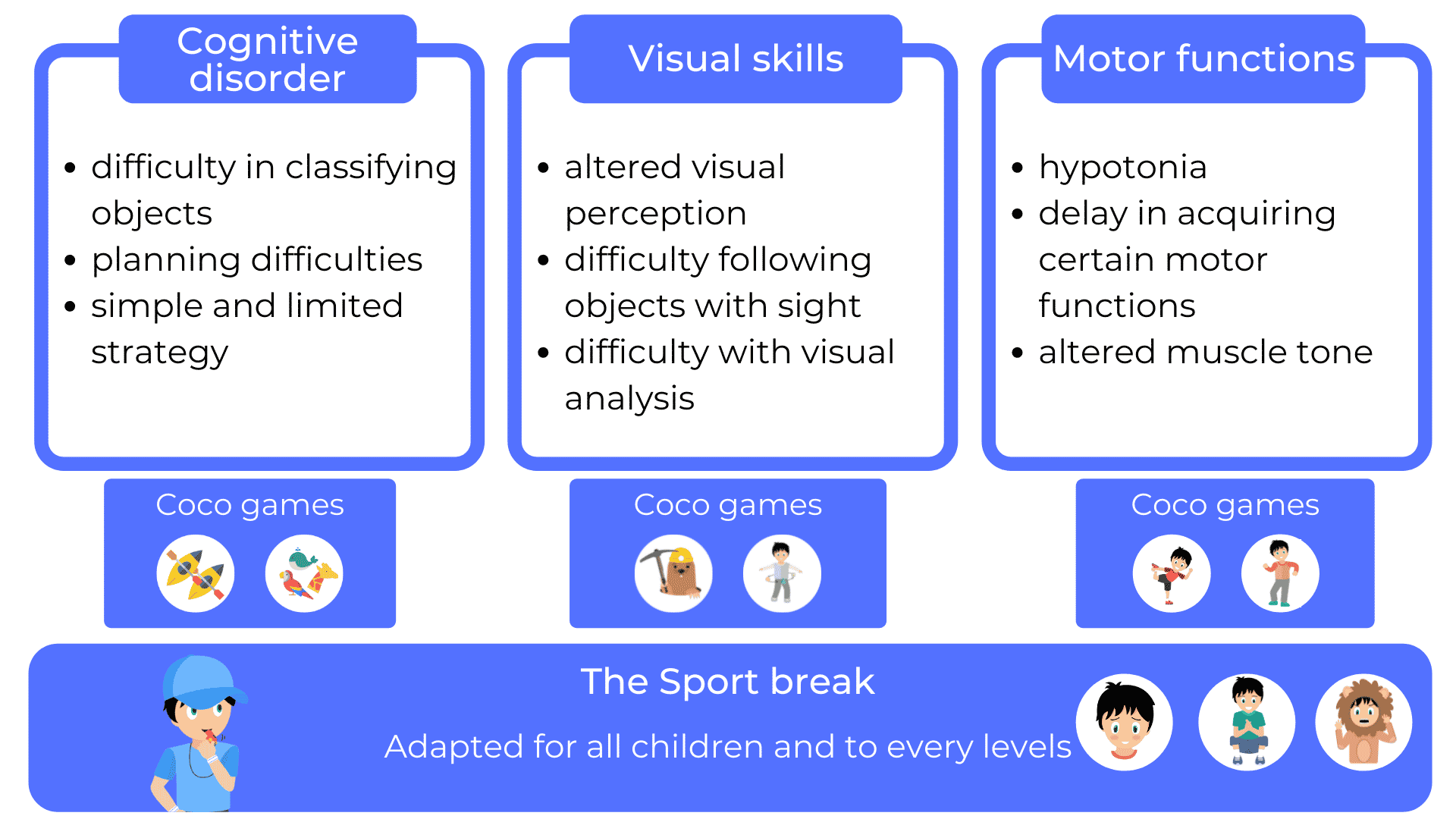
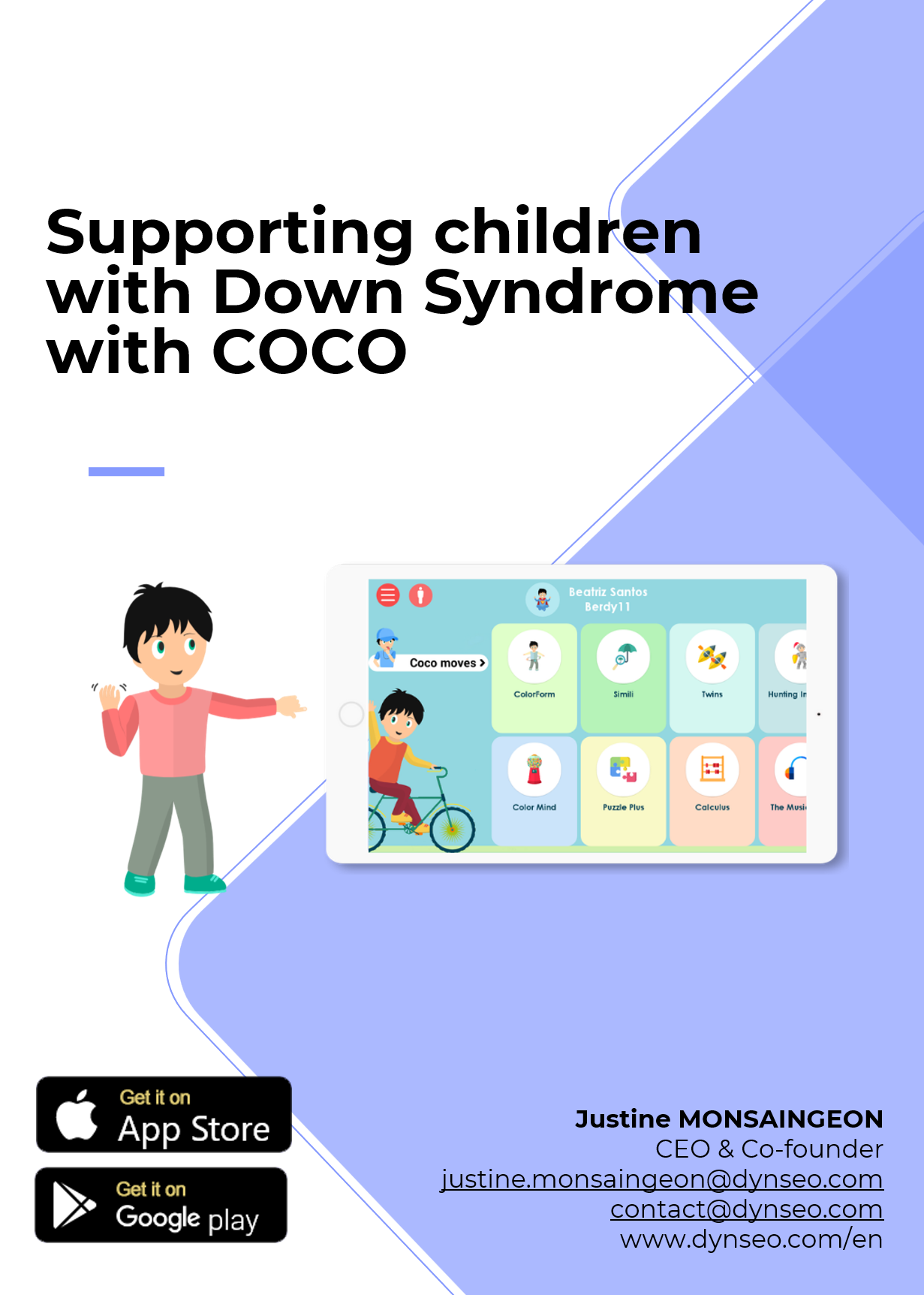
01.
GAMES ADAPTED ACCORDING TO THE FORM OF DOWN SYNDROME
Discover the most suitable games for children with Down syndrome within the COCO THINKS and COCO MOVES program.

Coco Cooks

Bouncing ball
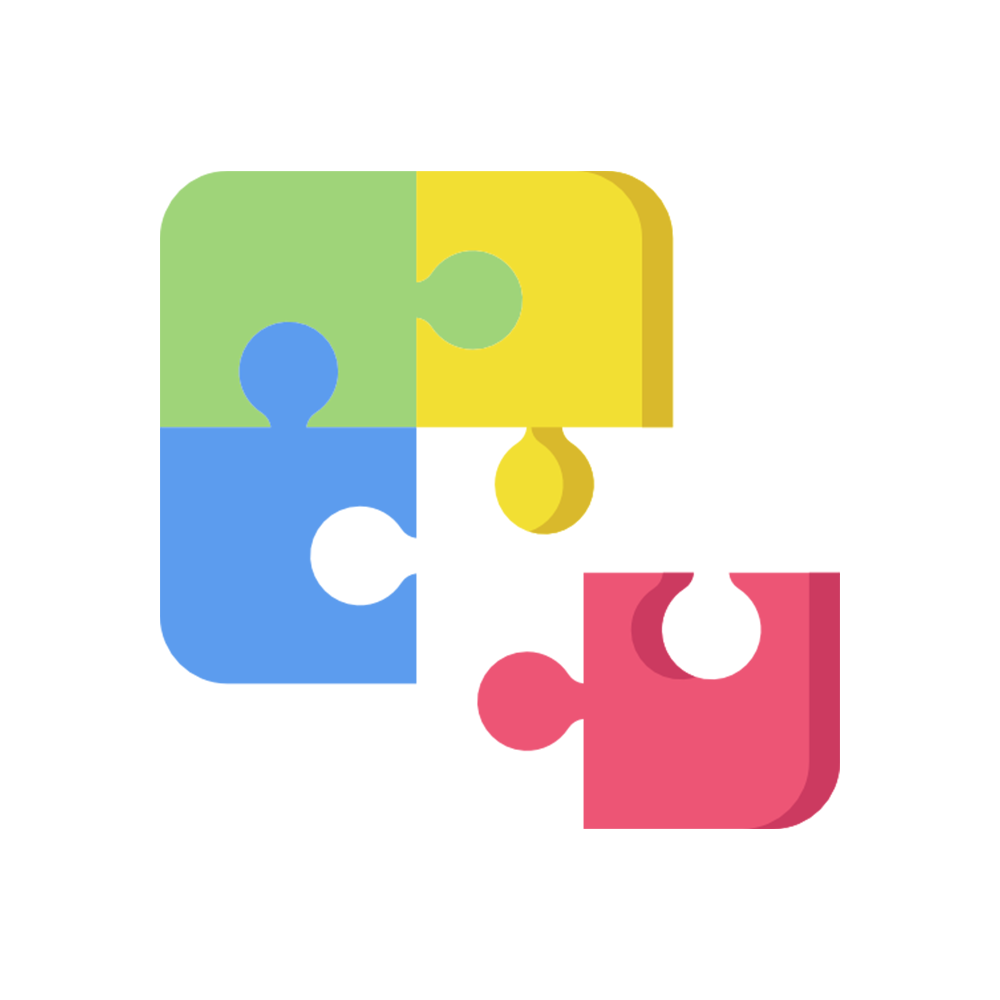
Puzzle Plus
TYPES OF DOWN SYNDROME
There are different forms of Down syndrome because each child is different, with specific difficulties and needs. It is therefore important to personalize the work for each child. Thanks to 3 levels of difficulty Coco can be used and adapted to each form of Down syndrome.
Among the different Down Syndrome genes, there is Trisomy 21, where three copies of chromosome 21 instead of two, translocation happens when only a part of chromosome 21 breaks off during cell division and attaches to another chromosome, or mosaic trisomy, where there is a mixture of two types of cells, some containing 47 chromosomes and others 46.
The follow-up of a child with Down syndrome differs according to the form of Down syndrome he has. We will therefore advise you on the use of the COCO app according to the various stages of Down Syndrome.
Mild Down Syndrome (stage 1)
Cognitive and developmental delays are mild. The child has below average skills. As the child grows, the difference in skills with others will increase, but they will be able to live semi-independently or fully independently and will be able to maintain a small amount of work. At this stage you can use the games at difficult levels
Coco Cooks
Memorize the procedure or the ingredients of the recipes.
In this game you can stimulate different functions at the same time.
In the first phase, the game shows the recipe, and the child must memorize the ingredients. You can stimulate sequencing in the “recipe” mode (the child must remember the procedure) or verbal or visual memory in the “ingredients” mode (the child must memorize the different ingredients).
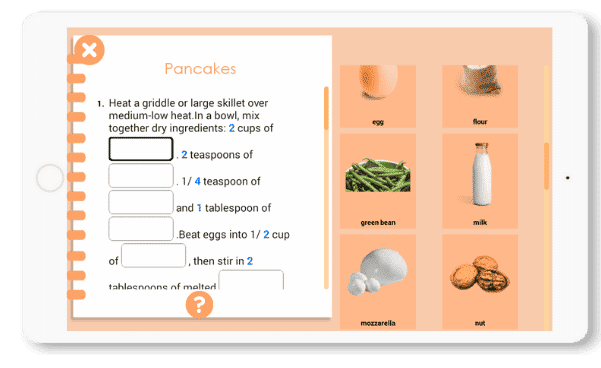
The presence of the pictures helps the recognition of the ingredients and allows the game to be used with children with language disorders.
In addition, the pictures help stimulate lexical access.
All these skills are fundamental in creating and maintaining independence.
Furious Cards
Memorize the order of the cards.
The images are simple, to allow the child to recognize them well.
Depending on the level of difficulty, there is a different number of cards to memorize (3, 4 or 5). This way you can adapt the difficulty and increase the memory capacity.
In the first phase, the child must memorize the order of the cards. You are therefore stimulating attention. Then, the child must put the cards back in order: you stimulate the immediate memory.
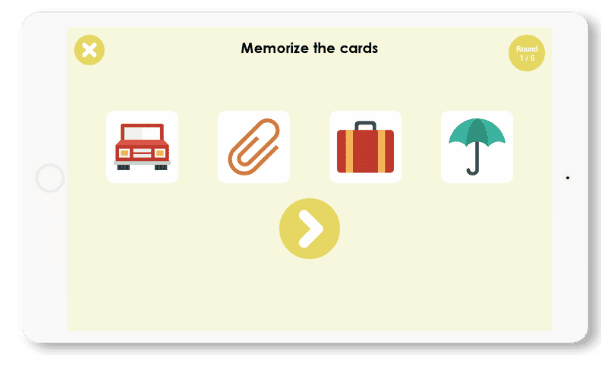
You can also ask the child to name and memorize the pictures to stimulate language and verbal memory.
In addition, to move the cards you stimulate the eye-hand coordination.
To move the ball, the child must press the arrows on the right side of the screen, thus stimulating finger motor skills.
In this game, there are several objects (the ball, the obstacles, Coco) so you also stimulate divided attention.
Moderate Down Syndrome (stage 2)
The cognitive delay is greater, and the child can learn and improve skills to a certain limit. The person will still need help in daily life but can do small jobs in a protected environment. At this stage you can use games at the medium level.
Coco at the beach
Find the fastest way to return Coco’s ball.
With this game, you stimulate visual-spatial construction since the child must imagine the movements of the ball in space.
You also stimulate planning, as the child must look for the fastest route and pay attention to the obstacles.
To move the ball, the child must press the arrows on the right side of the screen, thus stimulating finger motor skills.
In this game, there are several objects (the ball, the obstacles, Coco) so you also stimulate divided attention.

Bouncing Ball
Touch the ball as soon as it appears on the screen.
In this game you stimulate the finger motor skills but also other cognitive functions.
The ball always appears in a different place on the screen, so you stimulate attention to see when the ball appears and visual scanning to locate the exact spot where it appeared.
You are stimulating eye-hand coordination to hit the ball. The ball is always in motion, so the precision of the touch is fundamental.
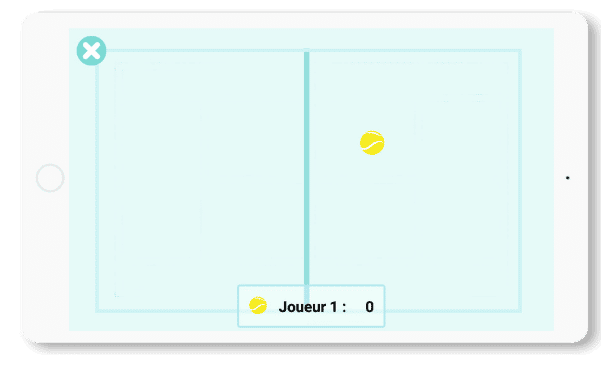
You can stimulate finger motor skills by asking the child to touch the ball with a different finger each time the ball appears, or you can alternate between right and left hands to stimulate bimanual skills.
To finish the game, you must hit ten balls, which increases the amount of time the child can and should pay attention.
Severe Down Syndrome (stage 3)
The developmental delay is significant and influences many cognitive functions. The child needs a lot of assistance and is not able to achieve independence. In this situation you can use games with easy levels.
Noah’s Ark
Slide the animals in pairs into the ark.
The use of animal pictures makes it easy to recognize the images and therefore allows this game to be used also with children with Down syndrome who have a more severe delay.
First, you stimulate visual scanning as the child must look at all the animals on the screen. Then you work on the association skills to find the pairs of animals.

Once the animal pairs are identified, the child uses eye-hand coordination and fine motor skills to select the correct animal and slide it into the arch.
Have them pick up the first animal with one finger and the second with another finger to stimulate fine motor skills or have them alternate hands to stimulate bimanual skills.
Finally, ask the child to name the animal to stimulate lexical access or ask the child to pick up the animal you just named to improve comprehension.
Puzzle Plus
Recreate puzzles with the pieces present.
Puzzles are easy games that can be played at any age and cognitive level. They can be played with children with major cognitive delays.
With this game you stimulate visual perception as the child must analyse the different pieces on the screen and visuo-spatial construction as he must imagine the place of each piece to reproduce the final image.

You can see if the child uses any strategies to complete the picture (do they start at the edges, or do they build on the main picture? Do they look at just the pieces or the final picture as well?).
There are many ways to complete a puzzle so you can augment the child’s mental patterns.
02.
AREAS OF FRAGILITY IN DOWN SYNDROME
A child with Down’s syndrome can have a variable cognitive delay, different difficulties at more or less severe stages. Coco can be adapted to a severe form of Down syndrome, but also to the cognitive functions you want to improve.
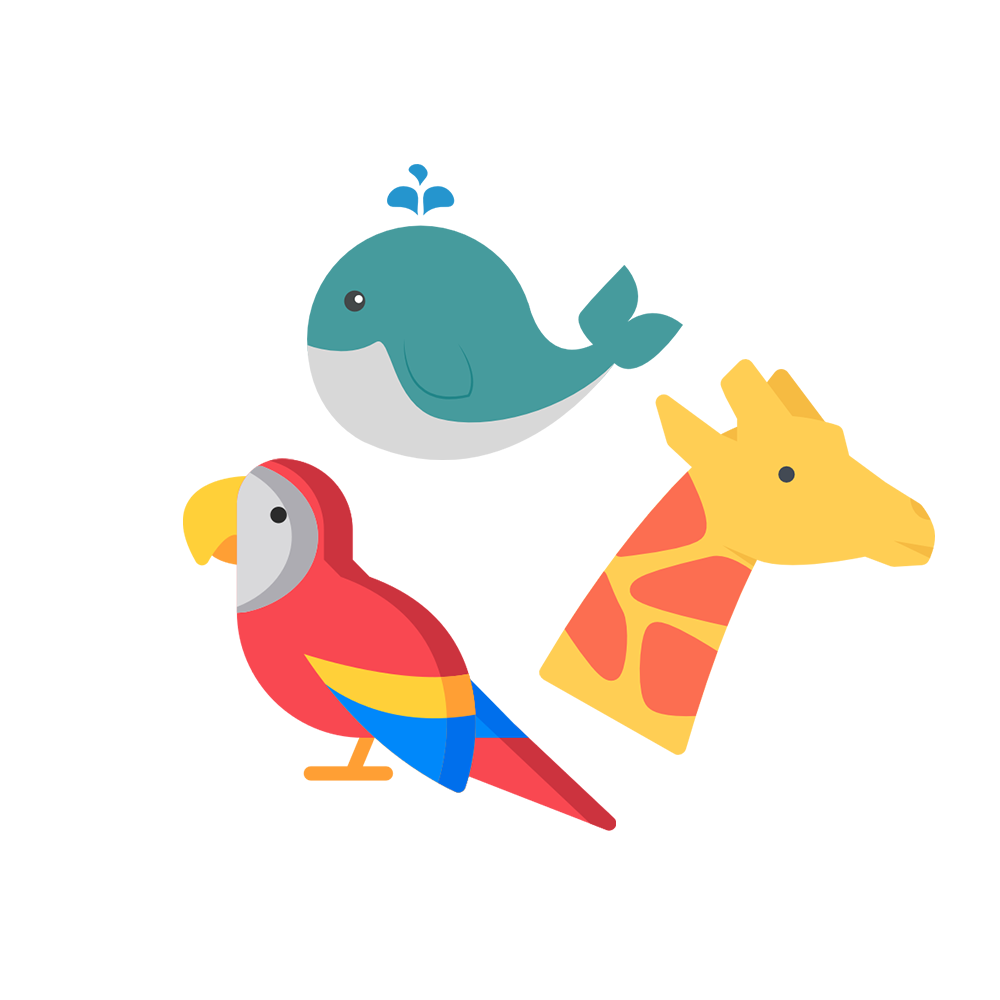
Carnival of the Animals

Twins

Mole invasion
Cognitive disorders
Children with Down syndrome still have cognitive difficulties which may be difficulties in recognizing or classifying objects, difficulties in planning or in establishing strategies which are simple and limited. Cognitive stimulation for children with Down syndrome is possible and can help them improve their skills and enrich their strategies.
Carnival of the Animals
Match each animal to its natural habitat.
In the easy level, you are only asked to differentiate between animals living on land, in the sky and in the sea (3 habitats). You can stimulate a first basic classification and look for common characteristics (birds have wings for example).
In the medium and difficult levels there are eight habitats to choose from. In these levels you are asking for more identification and analysis. The child should not only focus on the characteristics of the animals, but also on the characteristics of the habitats.
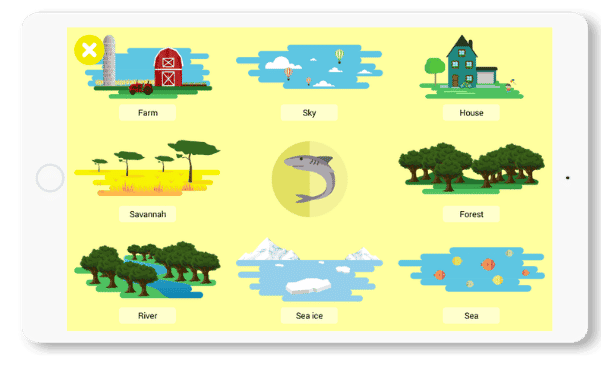
Ask them to name the animals or habitats and describe them to also work on language.
Twins
Memorize the position of the cards and find the duplicate images like in a memory game.
First, the game exercises the child’s attention by showing them the location of the pieces. Then, the child must remember the position of each piece to find the pairs: you stimulate the immediate memory and the visual memory.
It is possible to play this game two, each in turn, so you can stimulate patience.
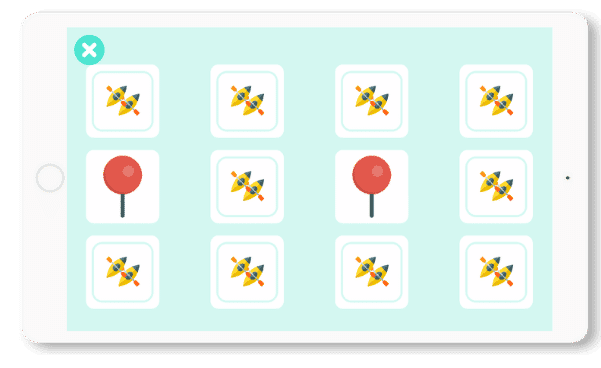
The memory game is a game known by all children and can therefore become an activity to share with friends.
Visual skills
Often children with Down syndrome also show problems in visual skills. You may see impaired visual perception, difficulty following objects or visual analysis. These skills are important to be able to act in the environment and reach a good stage of autonomy.
Moles Invasion
Type the moles as soon as they appear on the screen.
With this game you stimulate the activation and inhibition of the movement since there are three different moles that require different behavior: the normal mole must be touched once, the mole with the helmet twice and the mole with the glasses must not be touched.
The child must therefore use their visual scanning to locate the mole, recognize it and identify it by associating stimuli and action.

In addition, the action to be conducted is not always the same, so the child must change their mental scheme to act according to the stimuli present.
ColorForm
Find the right shape or colour according to the model.
In this game you can choose to have a stable request (the child must find only the colour or only the shape) or to have a variable request at each round (10 rounds per game) where the child must adapt to the request.
The request can be to find the shape, the colour or both at the same time.
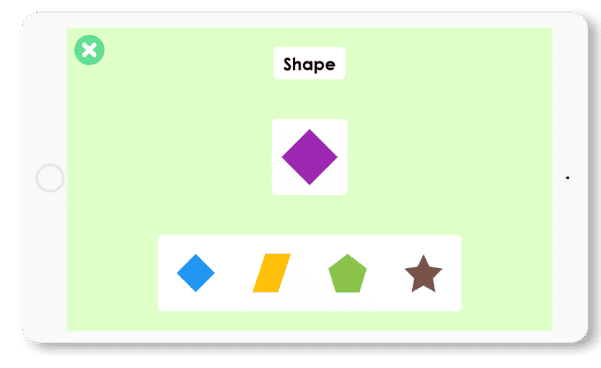
With these differences you stimulate the activation and inhibition of movement as the child must find the requested object quickly but carefully (if the child must look for the colour twice in a row and then must look for the shape, he must inhibit the concept of “colour” and activate the concept of “shape”).
The child must also perform visual analysis of the images and colour classification.
Motor skills
A symptom present in Down Syndrome is the presence of hypotonia, that is to say, an alteration in muscle tone. This condition influences the child’s motor skills and slows down the acquisition of different motor steps. Thanks to Coco, it is possible to stimulate motor skills with ” Coco moves “, a sporty and dynamic break to learn to know their body and their movements.
The acrobat
Hold the position indicated by Coco until a new position appears.
With this game you stimulate different motor skills.
First, the child must look at Coco, analyse the position of each body part and create a mental image of this position. Then they must adapt their body to reproduce this mental image and therefore the position.
Thanks to this game the child learns to know their body and to recognize their movements in space. they will thus improve their body scheme.
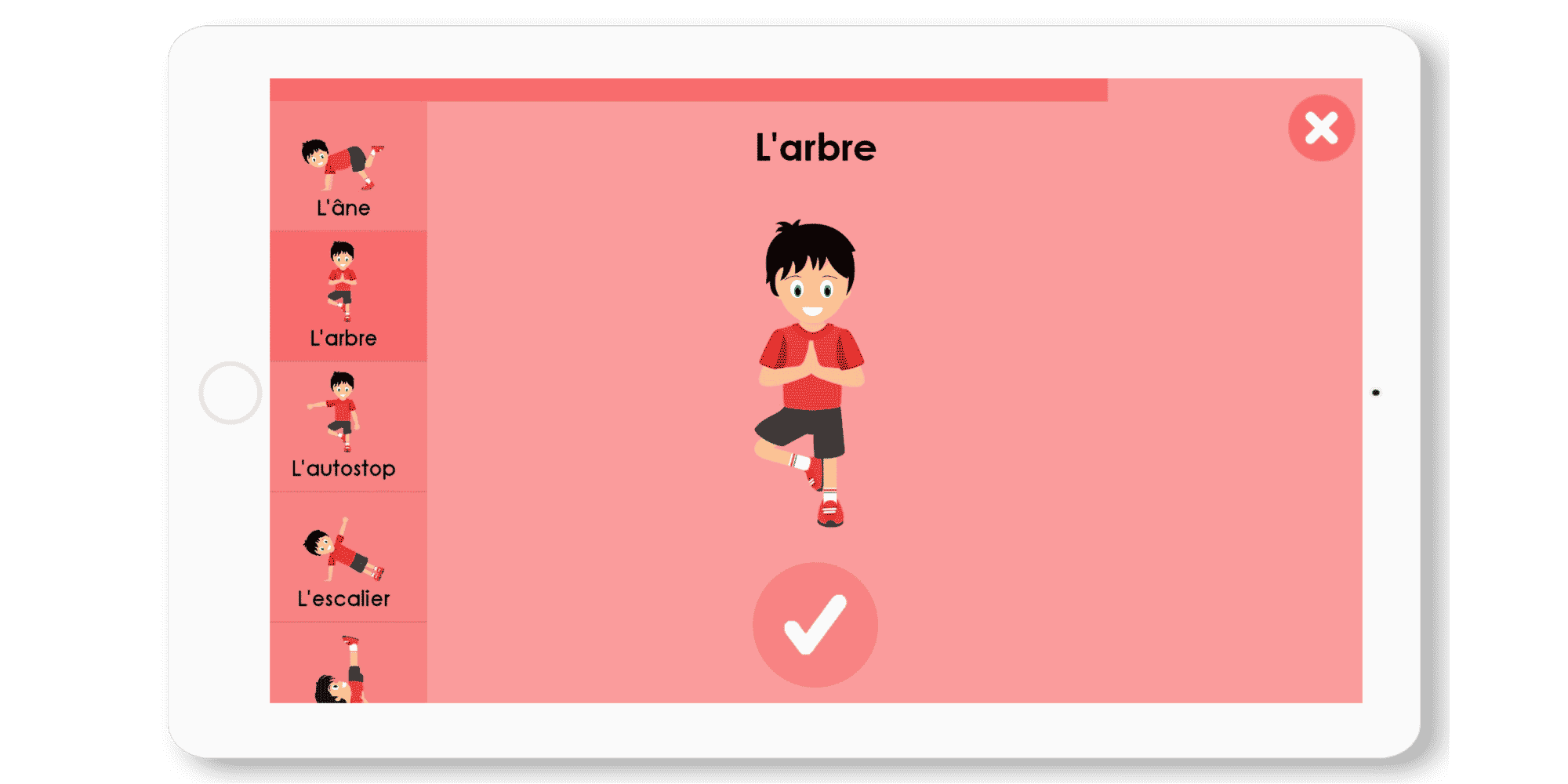
All the positions proposed work on the balance, so, to maintain the position, the child must modulate their muscular tone.
Dance with Coco
Dance with Coco to the rhythm of the music.
Children can dance according to their desire or follow the choreography proposed by Coco, the important thing is to follow the rhythm of the music.
With this game you stimulate the adaptation of the movement, which must be slow or fast according to the music.
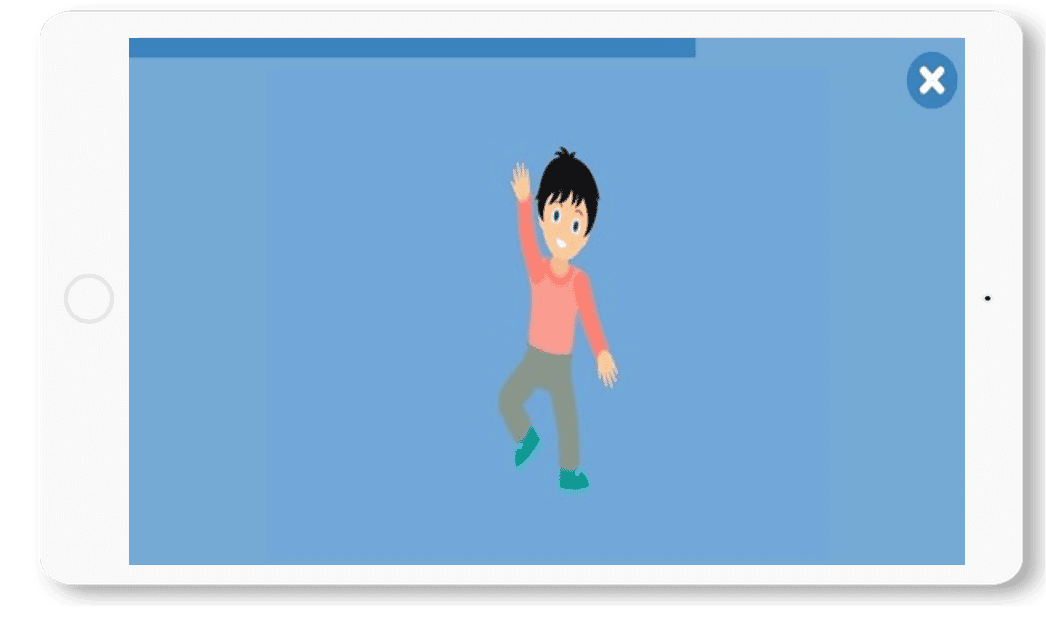
To adapt the speed of their movement, children work on the adaptation of the muscular tone which changes according to the rhythm of the music.
If you ask Coco to follow the choreography, you also stimulate body image and the perception of their body in space.
TWO-PLAYER GAMES
Children with Down syndrome are often very social and affectionate. They want to play with others and be part of a group, even if the relationship with other children is not always easy. The difference between the skills of children with Down syndrome and their peers can sometimes create a distance, but it is especially important for them to have a group of friends with whom to play and share activities. Coco offers an effective solution because the program offers games for two. Children with Down syndrome can share an activity with their friends thanks to a tool that allows everyone to play safely.
Shapebox
Find the same shape or colour as the pattern.
In the two-player mode, each player has a button on their side of the screen and the objects scroll down the middle of the screen. So, you must share the tablet and look at the same objects.
The game uses the same concept of shape and colour recognition as other games in the Coco application. The child with Down’s syndrome will have all the necessary skills to play this game with other children.
With this game you stimulate the cognitive functions, but also the relational.
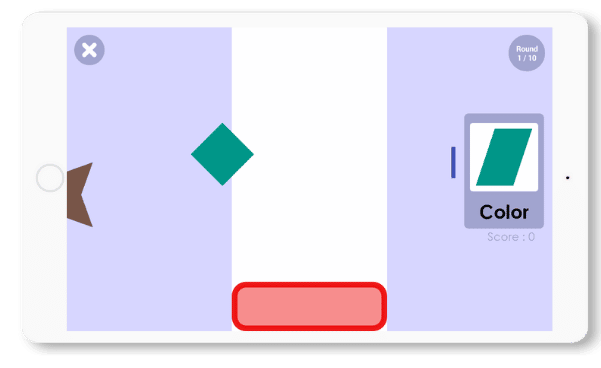
The Musical Ear
Listen and recognize the sounds.
In this game you have three game modes: you can choose between recognizing the sounds of objects, instruments, or animals.
This game is perfect for creating a group activity. You can create several teams and see which team recognizes the sound first.
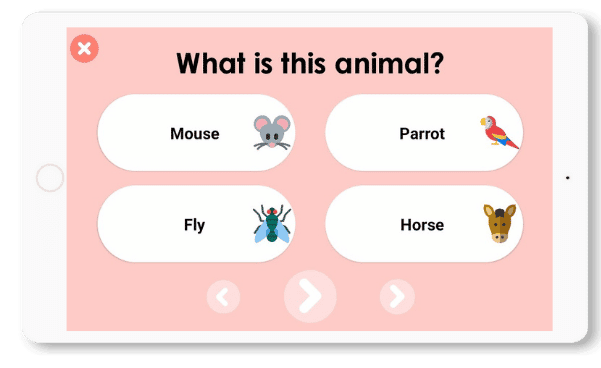
You can also ask them to imitate the animal or instrument. Being in teams can help children with Down syndrome because they are in a small group where there are fewer variables to manage. Also, as a team, they can imitate others, or they can be helped by the other children.
With this game you can create a collective and inclusive activity.
In addition, you stimulate cognitive functions such as discrimination, hearing, attention, and memory.
03.
MONITORING THE LEARNING OF CHILDREN WITH DOWN SYNDROME
The careful monitoring of the learning of children with Down syndrome makes it possible to personalize teaching methods and adapt learning objectives to their specific needs, thus promoting their overall development. Regularly assessing their progress and adjusting teaching strategies maximizes the chances of success and inclusion in the education system.

Tangram

Shooting Stars
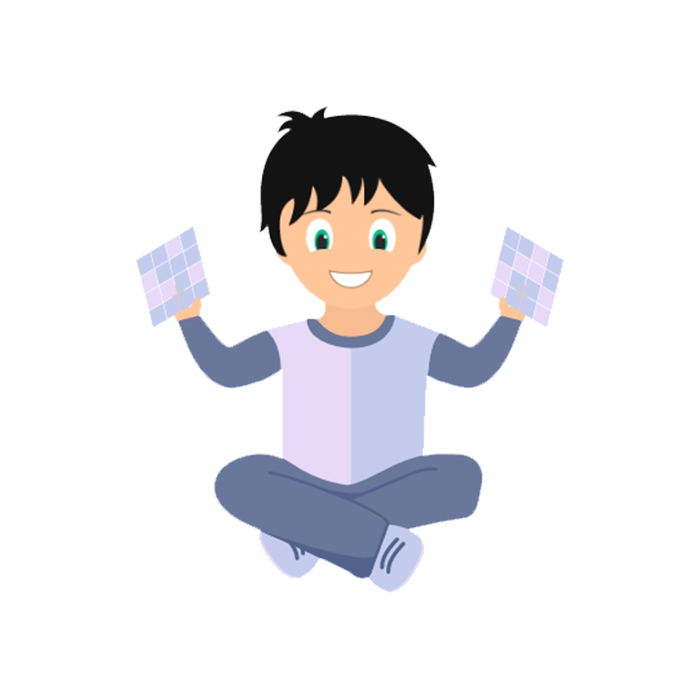
Crazy Chessboard
Tangram
In this game, the child has to use the pieces to complete the model.
Tangram play has significant utility for children with Down syndrome by promoting the development of their spatial skills, coordination, and problem–solving. By manipulating the geometric pieces, these children can improve their understanding of shapes and spatial relationships, which is beneficial for their cognitive development.
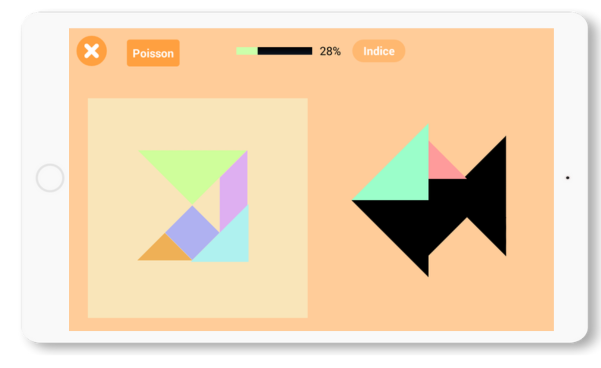
Shooting Stars
In this game, the child has to click the numbers in the exact order.
This game offers children with Down syndrome a playful opportunity to learn and strengthen their understanding of digital concepts in an interactive way. By engaging them in an enjoyable activity, this game stimulates their concentration, memory and reasoning skills while promoting their cognitive development. In addition, by adapting the level of difficulty according to their skills, this game encourages their progress and builds their confidence in a positive and inclusive learning environment.
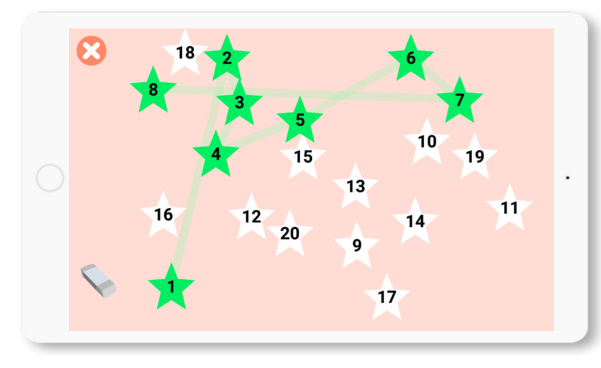
Le damier fou
In this game, the child has to memorize the location of the colored squares.
This type of play engages visual and spatial memory, which can help strengthen the memory skills of the child with Down syndrome. In addition, while playing this game, the child should use his or her concentration, observation, and thinking skills.
Playing this game can be a social activity, where the child can interact with peers or adults, thus promoting the development of social skills and self–confidence.
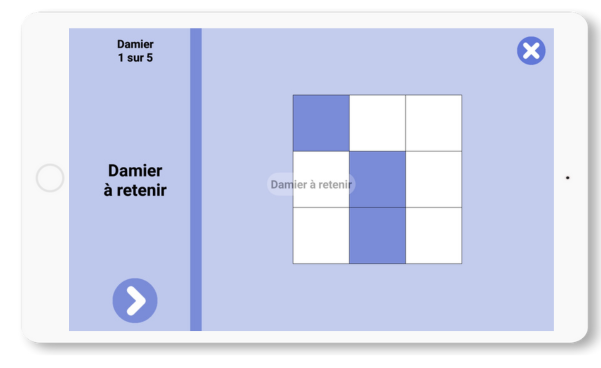
LEARNING FOLLOW-UP
In the COCO THINKS and COCO MOVES programs, there’s also a function that lets you see your child’s evolution over time. You can see the results obtained and the time spent in each game, for feedback on the work done. This feedback can be useful during therapy to see if the child is achieving the objectives, at school to see the child’s level, or at home to monitor the child’s development.
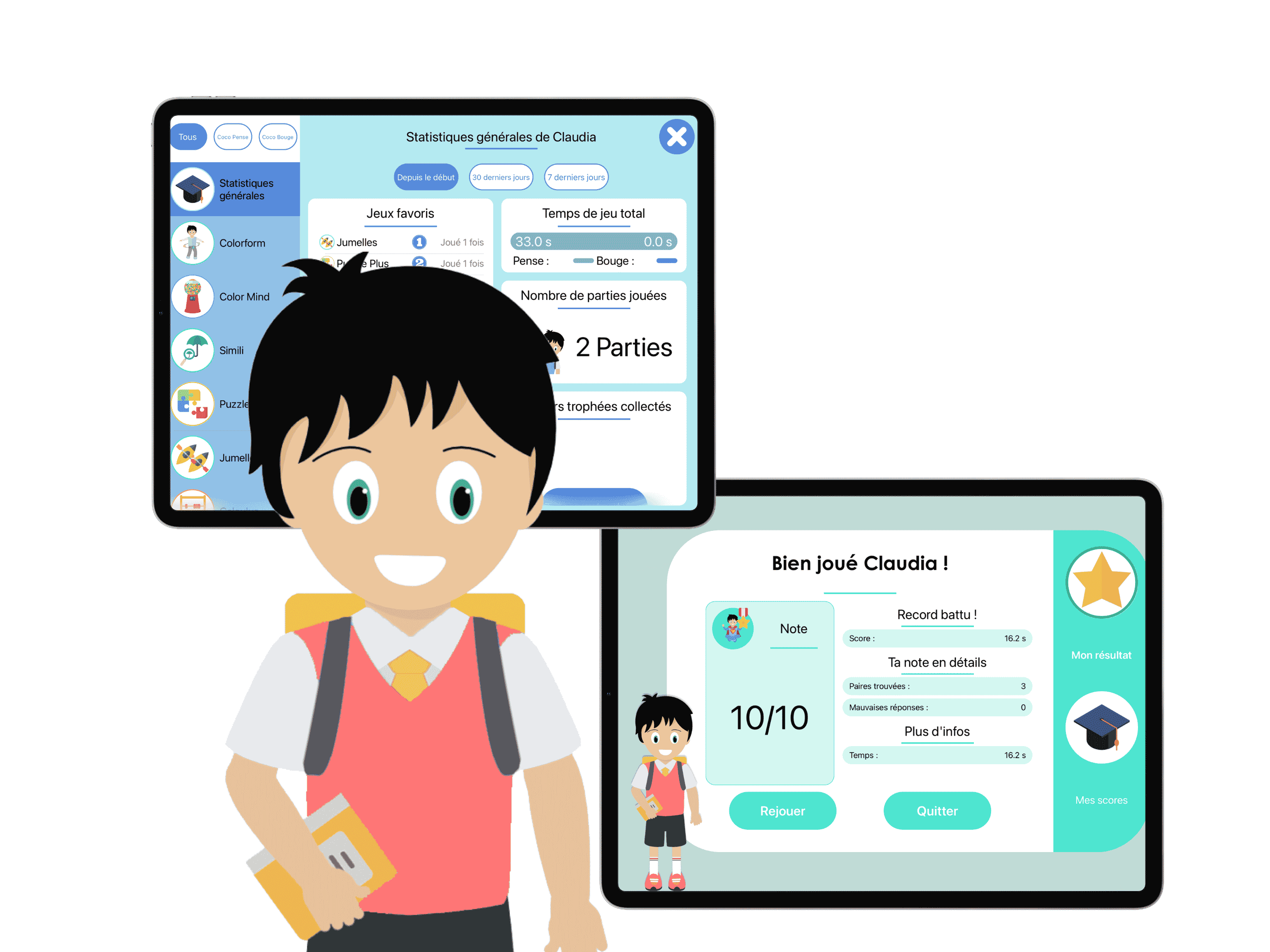
PRACTICAL STRATEGIES
It is crucial to have practical strategies in place for children with Down syndrome to facilitate their learning and development. These strategies allow them to better understand and retain information, building on their strengths and adapting teaching methods to their specific needs. Providing individualized support and promoting the use of visual aids and multisensory approaches maximizes the chances of success and builds their self–confidence. In addition, these practical strategies promote their autonomy and inclusion, helping them to fully develop in their educational and social journey.
- Individualization of goals: Tailor learning goals to the specific needs of each child with Down syndrome, taking into account their strengths and challenges.
- Use of visual aids: Introduce visual aids, such as pictures, diagrams, or diagrams, to help with understanding concepts and remembering information.
- Encouraging multisensory learning methods: Involve multiple senses in the learning process, using activities that involve sight, hearing, touch, and movement to strengthen retention and understanding.

4. Adaptation of teaching methods: Modify teaching methods by using more concrete and practical approaches, repeating instructions in a clear manner, and providing concrete examples to facilitate understanding.
5. Encourage repetition and regular practice of skills to strengthen mastery and consolidation of knowledge.
6. Foster a structured and predictable learning environment by using visual routines and schedules to help reduce anxiety and promote focus.
7. Use appropriate technological tools, such as interactive educational apps or software, to provide individualized and engaging learning activities.
8. Promote active participation by encouraging children to ask questions, express their ideas and participate in group discussions.
9. Provide positive reinforcement and rewards to encourage progress and maintain motivation, using reward systems tailored to each child‘s interests and needs.
10. Provide individual support by identifying each child‘s specific needs and tailoring activities and resources accordingly.
04.
THE BENEFITS OF A SPORTS BREAK FOR CHILDREN WITH DOWN SYNDROME
A sports break for children with Down syndrome provides physical benefits by improving their cardiovascular health, motor coordination, and muscle tone, while promoting their emotional well–being and self–esteem through social interaction and inclusion in recreational activities.
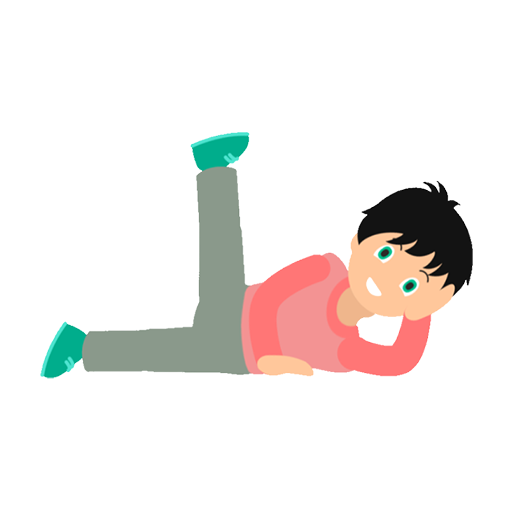
The yogi apprentice
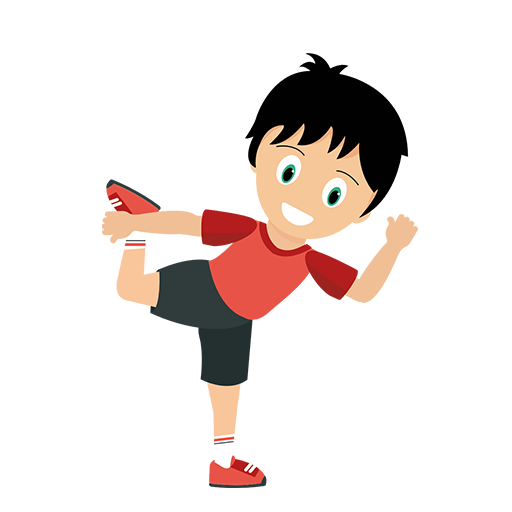
The acrobat
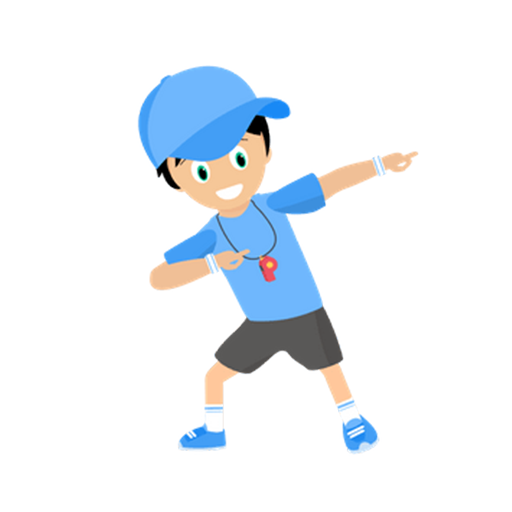
1, 2, 3 Red light
THE BENEFITS OF A SPORTS BREAK
Participation in sports activities helps develop social skills, such as teamwork and communication, and provides a valuable opportunity for integration into the community, strengthening their sense of belonging and self–confidence.
In the Coco app, every 15 minutes of screen use, the app stops and offers a dynamic pause.
1,2,3 Red light
In this game, the child has to move following the music and he has to stop when the music stops.
Thanks to this game, the child can move and therefore exert himself. He has to pay attention to the music and stop when the music stops. It can therefore learn to adapt to external stimuli.

The yogi apprentice
In this game, the child has to reproduce yoga positions.
Yoga provides children with Down syndrome with a gentle and adaptable practice that promotes the development of their flexibility, muscle strength, and balance, helping to improve their gross motor skills. In addition, this practice promotes body awareness and self–esteem, boosting their self–confidence and emotional well–being.
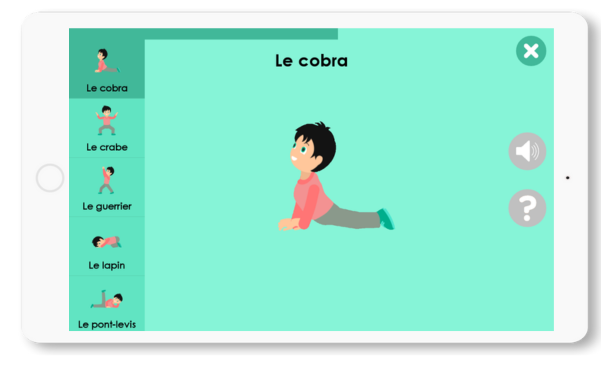
These sports activities also provide children with Down syndrome with opportunities to improve their self–esteem and self–confidence. By overcoming physical challenges and achieving personal goals, they strengthen their sense of accomplishment and learn how to better manage frustrations and failures, skills that are important in their daily lives. In addition, sport helps to stimulate concentration and attention. By integrating sport into the school setting, we create an environment conducive to the development of all children, including those living with Down syndrome, thus promoting their social integration and academic success.
Introducing a sports break in the classroom has many benefits for children with Down syndrome. In addition to improving their physical health by promoting the development of motor coordination and endurance, this activity offers a welcome break from their learning routine, helping to boost their concentration and reduce stress. Physical exercises tailored to their specific needs also boost their self–esteem by giving them the opportunity to succeed in an inclusive and caring environment. In addition, the sports break encourages social interaction, thus promoting their integration within the classroom and strengthening bonds with their peers. By combining physical, emotional and social benefits, a sports break in the classroom is a holistic approach to support the overall development of children with Down syndrome.
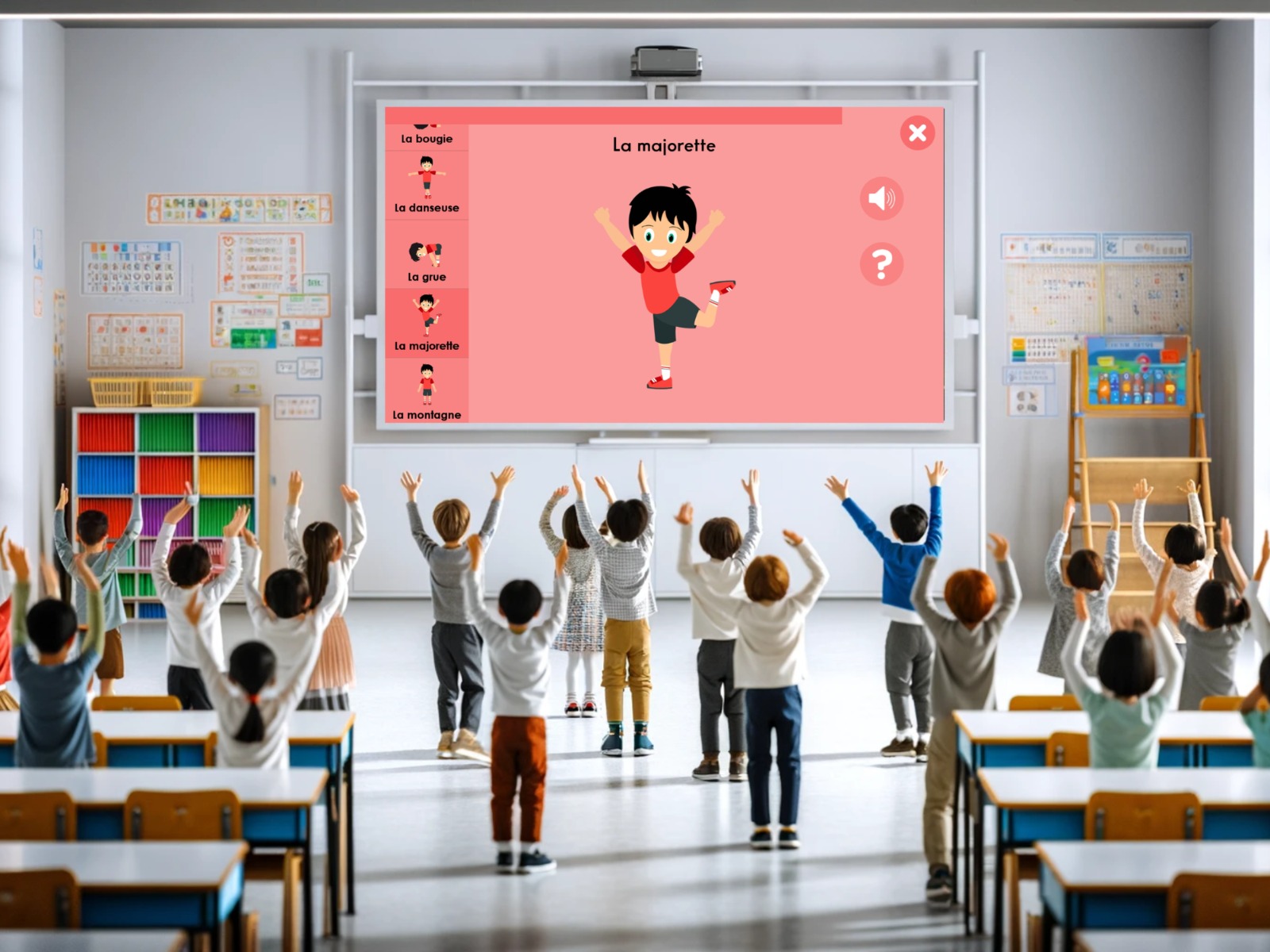
Here are all the technical data sheets for the games presented, with the cognitive stimulated by each game.
